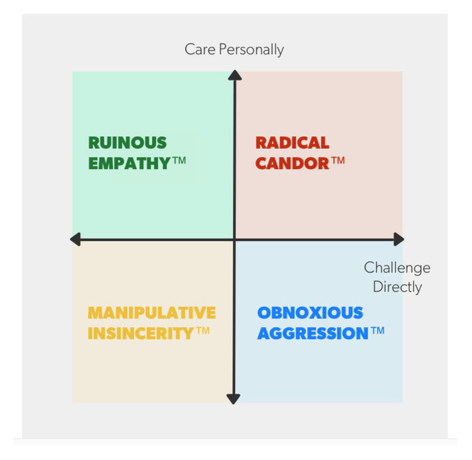
If you have ever worked with me you know I am a sucker for strong feedback and coaching. Here’s why.
People are the foundation of any sales organization and if the people don’t grow, the organization can’t either. One of the very best ways to grow people is to provide them with strong, consistent, and targeted feedback so they can adjust their style, adapt their approach, and turn their talent into performance.
A few weeks ago, I had the opportunity to work with an exceptional manager whose secret weapon for growing people is effective feedback. His genuine caring combined with his never-miss-a-thing insight can be life-changing for those who work for him.
I was anxious to better understand what he did so naturally and most others struggled to do at all, so I pummeled him with questions. And he let me in on his secret.
This manager built his career on two principles.
- Praise: People need to receive specific and positive feedback from their manager when they do things right in order to consistently repeat those positive behaviors.
- Criticism: A manager has a “moral obligation” to be upfront and honest with their employees when providing them with corrective coaching.
Moral obligation? I wanted to hear more.
It was then that this manager recommended that I watch Kim Scott’s presentation on Radical Candor – the Surprising Secret to being a Good Boss. It’s a must-see.
Kim Scott, co-founder of Candor, Inc. was a long-time director at Google and a faculty member at Apple University. Scott studied the best ways to maximize employee performance and determined that the single most important ingredient was “guidance” which is comprised of both praise and criticism. She uses the term “guidance” rather than “feedback” because, in her opinion, guidance has a more positive connotation for those receiving it. I can’t say I disagree.
To provide strong guidance, Scott explained that a manager needs to wield the most effective tool possible, Radical Candor. You should watch her 20-minute presentation, but here’s an easy way to understand the concept of Radical Candor. The graph below is divided into four quadrants by a vertical axis, Caring Personally and a horizontal access, Challenging Directly. Radical Candor happens when a manager deeply cares about the person they are coaching and also provides them with candid information that may not always feel good. A manager who does not live in the quadrant of Radical Candor falls into one of the other three quadrants that you can see lead to failure.

Scott shared a story about managing an employee who was extremely likeable but not meeting her expectations. In an effort to be kind, she avoided the tough talk that he probably really needed, hoping he would improve. This went on for nearly a year, negatively impacting the entire team, before she realized she was on the cusp of losing several of her top performers. It finally hit her. While she was trying to be kind to Bob, she had inadvertently been unfair to those on her team who were performing.
She described this dark moment in her career like this: “Having never criticized Bob for 10 months because I was trying to spare his feelings, I was now sitting in front of Bob firing him. Not so nice after all. When I told him, Bob pushed his chair back, looked at me, and said, ‘Why didn’t you tell me? Why didn’t anyone tell me?’”
From the ashes of this management failure, Radical Candor was born.
Are you living up to your moral obligation to grow your people using radical candor? Do your people know what they are doing right- and wrong?
Here are 8 ways to increase performance with successful guidance – and radical candor:
- Set clear expectations so each individual knows exactly what success looks like.
- Hold people accountable to those expectations. As long as their goals are set well, this grows them as much as it grows the company.
- Pay attention while they perform so you don’t miss an opportunity to notice their behavior. (You won’t be able to do this from your office.)
- Share your detailed observations with them right away while it’s still fresh in your mind and theirs.
- Don’t wait for them to achieve success before giving them feedback. Point out what they are doing right and wrong along the way so they can course correct and better reach their goals.
- Prepare in advance before providing feedback. Consider the right place to have this conversation, recall as many specifics as you can so they can have the full picture, and jot down a few talking points so you don’t miss a thing.
- After using Radical Candor with an individual, immediately give them an opportunity to be successful and earn the more positive reaction they really want.
- Always, always, always be consistent.
I know you are busy and you have lots of stress and responsibilities on your shoulders. There is probably not an unused minute in your day! But you have to make time for this. When you do, you will find that guiding your people and providing consistent feedback will grow them and in turn, grow your business. It’s not fluff. It’s real — and your time will pay off!


